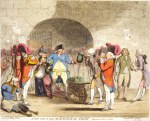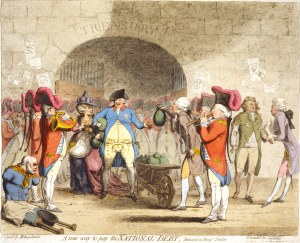submitted by jwithrow.
Journal of a Wayward Philosopher
Election Day
November 4, 2014
Hot Springs, VA
The S&P has risen to $2,009, gold has dropped to $1,167, oil is down around $77, bitcoin is at $328, and the 10-year Treasury rate is checking in at 2.33% today.
Looks like gold is still sitting on the clearance rack begging to be purchased. Gold jewelry would be a great Christmas gift this year! Just be sure to negotiate the price down significantly from whatever the price tag says. Did you know there are still cultures out there that store their wealth in gold jewelry? People in places like India and China must not have gotten their central bank’s memo: gold is barbaric, government paper currency is civilized. (Pay no attention to all of those pointless wars that were financed by government paper currency.)
Speaking of civilization, it is Election Day! Election Day affords every American the opportunity to honor that great tradition known as voting by rushing off to their local polls to support whichever Joe, Bob, or Dick (or Hillary) has promised to fix all that ails us and to move us forward. I am not sure exactly why all of us need to be moved forward but this apparently isn’t open to inquiries. It is every American’s right and responsibility to participate in our fine electoral process else be called a “commie”.
But you know… not everyone is quite so enthusiastic about voting. Let’s give some of the dissenting voices a hearing for a minute:
“Democracy is two wolves and a lamb voting on what to have for lunch.” – Benjamin Franklin
“If voting made any difference they wouldn’t let us do it.” – Mark Twain
“Every election is a sort of advance auction sale of stolen goods.” – H.L. Mencken
“It makes no difference whom you vote for – the two parties are really one party representing four percent of the people.” – Gore Vidal
“It’s not the voting that’s democracy, it’s the counting.” – Tom Stoppard
“No matter who you vote for, the government always gets in.” – Neil Innes
“The difference between a democracy and a dictatorship is that in a democracy you vote first and take orders later; in a dictatorship you don’t have to waste your time voting.” – Charles Bukowski
“Perhaps the fact that we have seen millions voting themselves into complete dependence on a tyrant has made our generation understand that to choose one’s government is not necessarily to secure freedom.” – Friedrich Hayek
“In politics we face the choice between warmongering, nation-state loving, big-business agents on one hand; and risk-blind, top-down, epistemic arrogant big servants of large employers on the other. But we have a choice.” – Nassim Nicholas Taleb
Hmmm.
Come to think of it, nothing ever seems to change no matter which bobble head gets elected. No major legislation gets repealed entirely; at best it gets replaced by something equally as draconian with twice as many earmarks in it. At worst even more legislation is dumped on top of the steaming pile that already exists. There’s never a sincere effort made to reduce the size and scope of government or to even curtail spending increases. There’s never a sincere effort made to shore up the run-away welfare state that has bankrupted the government nor is any effort made to reel in the out-of-control warfare state that constantly runs amok in search of dragons to slay.
Side note: Microsoft Word suggests that I correct the previous sentence. It has underlined “has bankrupted” in green and suggests that I change the phrase to “has not bankrupted”. I guess Microsoft thinks I am over-analyzing the severity of the situation and thus will be voting its little heart out today.
As for me, I think I will side with P.J. O’Rourke on this one: “Don’t vote, it just encourages the [jerks].”
I see it as matter of personal responsibility: I am responsible for the well-being of myself and my family – government has no role to play whatsoever.
Joe Withrow
Wayward Philosopher
For more of Joe’s thoughts on the “Great Reset” and regaining individual sovereignty please read “The Individual is Rising” which is available at http://www.theindividualisrising.com/. The book is also available on Amazon in both paperback and Kindle editions.












